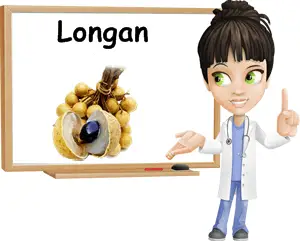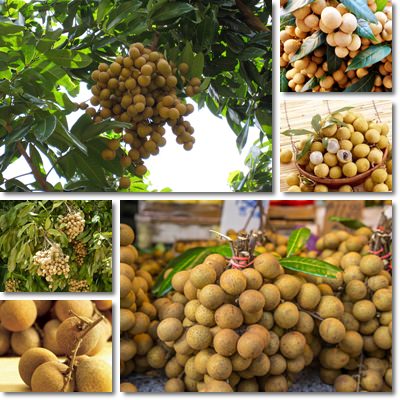Related to lychee and maple trees, the longan (Dimocarpus longan) is an Asian tropical tree whose fruit boast impressive anti-aging, antimicrobial and antioxidant properties, reduce stress and combat fatigue as a result of their excellent tonic properties. Longan fruit are called the ‘dragon eye’ fruit in Chinese culture due to their close resemblance to an eye when part of the shell is removed; the dark seed shining in the center of the translucent flesh like the ethereal, yet uncanny pupil of a golden-scaled dragon.
This glorifying analogy has to do with the fruit’s impressive health benefits that promise to revitalize, energize and improve our body’s resistance to stress and fatigue, in other words, pass onto us part of the longevity that makes the mythical dragon so great. Longan is used in traditional Chinese medicine for relaxation purposes, as a stress-relief food, as well as for invigorating the heart and spleen and nourishing the blood.
However, its generous vitamin C content and overall good vitamin and mineral content, as well as its low energy value and great dietary fiber content allow for the fruit to be used for a variety of medicinal purposes.

What does the longan fruit look like?
Longan fruits are small, round, rough to the feel and plump, quite similar in appearance to lychee (also see the benefits of lychee, litchi). When ripe, the inedible outer shell turns golden-brown and becomes dry and hard, with a texture similar to a thin piece of bark, allowing for the fruit to be easily cracked and the inside effortlessly squeezed out. The riper the fruit, the drier its shell. Longan fruit have a somewhat succulent, sheer, white flesh and one inedible round, black, shiny seed in the middle. The dried fruits look a lot like large dark-brown raisins.
What does the longan tree look like?
Longan trees are sun-loving, 15 meters tall trees with a rich green foliage and ample crown facing downwards. Its elongated, sagging leaves give it a very tropical look. Trees can easily be grown from a single seed, but require warm, tropical or subtropical temperatures and a sandy soil. Fruits ripen later than litchi and grow in huge, heavy-looking bunches.
What does the longan fruit taste like?
The taste of fresh longan fruit depends a lot on each variety in particular. Generally, longan fruit have a firm, but juicy flesh with a sour and sweet taste and musky, tropical aroma. Commercial varieties are grown to be sweeter and juicier, with only a slight tart flavor. The seeds and shell are not edible.

Longan fruit can be eaten both fresh, right from the tree, or dried. Preferred longan recipes include sweet and sour longan soup (similar to the Romanian sour cherry plum soup), longan and red date-filled mooncakes (a type of Chinese pastry), sweet red date and longan seaweed soup, longan smoothies and fruit salads (often in combination with litchi) and so on. As for its benefits, find out below what are the top 4 health benefits and nutrition facts of longan.
What are the benefits of longan?
Great anti-aging food
Longan fruit are rich in polyphenols, a type of naturally-occurring antioxidants that help counteract free radical cellular damage. By preventing extensive free radical damage to cells, these antioxidants help maintain skin firm, tissues healthy and organs functioning properly. This translates into a younger looking appearance, energy, good mood and an excellent state of health with lower risks for degenerative and chronic illnesses.
Rich source of vitamin C
Longan contains about 84 mg of vitamin C per 100 g of fruit pulp, a high enough value to allow us to rate it as quite the healthy fruit. As a result of its high vitamin C content, longan not only exhibits potent antioxidant properties, but it also improves blood health by increasing the absorption of dietary iron and thus contributing to a better management of anemia. Moreover, the fruit increases collagen production; collagen is the most abundant protein in the human body, present everywhere from skin to blood vessels.
Regular consumption of vitamin C-rich foods such as longan thus contributes to healthier, stronger and more elastic skin. Even more, vitamin C is known to exert a powerful antimicrobial activity by boosting immunity to respond better to bacterial, viral, parasitic and fungal infections.
Stress relieving properties
The stress-relieving properties of longan fruit are a result of the fruit’s rich mineral content. Longan contains potassium and magnesium, two essential dietary minerals that support heart activity and regulate blood pressure. Potassium and magnesium relax the nerves and the muscles. Meeting our daily demands of the two minerals means reducing our risk of palpitations, rapid heart rate, shortness of breath, dizziness, anxiety, nervousness and even fatigue.
Boasts tonic properties
When consumed with regularity, longan fruit have a tonic or reinvigorating effect on the body as a result of their good vitamin and mineral content. This energizing effect is doubled by the stress-relieving properties of the fruit, making longan an ideal food choice for anyone under constant stress or suffering from fatigue.
If you do plan on giving longan a try, which should be a pleasant experience if you already like lychee, pay attention to the origin of your fruit. Some producers spray them with sulfur dioxide to preserve them better, despite it being a potential allergen. The cleanest fruit will always come from your own tree, so why not plant a longan tree along with a litchi tree if the climate allows it? Not only are they delicious and healthy, but they also fruit gradually so you’ll have fresh fruit to nibble on for some time.
